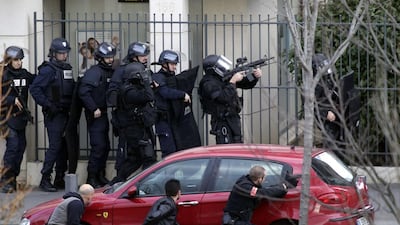BRUSSELS // French, German and Belgian police arrested more than two dozen suspects in anti-terrorism raids on Friday, as European authorities rushed to thwart more attacks by people with links to extremists in the Middle East.
Thirteen people were detained in Belgium and two were arrested in France in a security sweep by Belgian police following a shootout Thursday in the eastern city of Verviers. Two suspected terrorists were killed and a third wounded in that raid on a suspected terrorist hideout.
The suspects were within hours of carrying out a plan to kill police on the street or in their offices, federal magistrate Eric Van der Sypt said.
Security forces also found four military-style weapons including Kalashnikov assault rifles and several police uniforms in more than a dozen raids on Friday, Mr Van der Sypt said.
The authorities belive they have dismantled the core of an important terrorist cell, including the architects of the suspected plot, but more suspects could be at large, he said.
Most of those detained or killed were Belgian citizens and some had returned from Syria, but none had known connections to last week’s terror attacks in France, authorities said
The attacks on the satirical newspaper Charlie Hebdo and a kosher supermarket in Paris left 20 people dead, including the three gunmen.
One of the Paris attackers had proclaimed allegiance to the extremist group ISIL, and French and German authorities arrested at least 14 other people on Friday suspected of links to same terror group
French prime minister Manuel Valls said on Friday that while there was no apparent operational connection between the foiled plot in Belgium and the Paris attacks, “the link that exists is the will to attack our values”.
Belgium has seen a large number of residents join extremists in Syria.
“It’s the worst affected country in Europe relative to population size,” said Peter Neumann of the London-based International Centre for the Study of Radicalisation. He estimates 450 people have left Belgium to fight with extremists in Syria and that 150 of them have returned home.
Rob Wainwright, head of the police agency Europol, said foiling terror attacks had become “extremely difficult” because Europe’s 2,500-5,000 radicalised Muslim extremists had little command structure and were increasingly sophisticated.
Anxiety has grown across Europe as the hunt continues for accomplices of the three Paris gunmen. French police have said they were searching for up to six possible accomplices.
The Paris prosecutor’s office said at least 12 people were arrested in anti-terrorism raids, targeting people linked to the supermarket gunman Amedy Coulibaly, who claimed ties to ISIL. France has deployed 122,000 police and troops to protect the country, which is on high alert.
Highlighting the fears, a bomb scare forced Paris to evacuate its busy Gare de l’Est train station during the Friday morning rush hour. No bomb was found. A man also took two hostages at a post office in Colombes northwest of Paris, but police said the hostage-taker had mental issues and no links to terror.
In Berlin, police arrested two men on Friday morning on suspicion of recruiting fighters for ISIL in Syria. Prosecutors said 250 police officers participated in dawn raids on 11 residences, part of a months-old investigation into Turkish extremists.
Belgian authorties have said thay are looking for possible links between a man they arrested in the southern city of Charleroi for illegal trade in weapons and Coulibaly.
Several other countries are also involved in the hunt for possible accomplices to Coulibaly and the gunmen who attacked the newspaper, brothers Cherif and Said Kouachi.
A senior Iraqi intelligence official said officers warned their French counterparts two months ago that a group linked to Khorasan, an Al Qaeda-linked group in Syria, was plotting an attack in Paris.
Iraq’s prime minister had also warned in September of possible attacks in New York and Paris.
The US secretary of state John Kerry was in Paris on Friday to convey US condolences and lay wreaths to the victims at the two main sites of the attacks.
Mr Kerry’s visit came after the Obama administration apologised for not sending a higher-level delegation to Sunday’s massive rally in Paris, which drew world leaders and more than one million people to denounce terrorism.
French president Francois Hollande thanked Mr Kerry for offering his support.
“You’ve been victims yourself of an exceptional terrorist attack on September 11. You know what it means for a country,” Mr Hollande said. “Together, we must find appropriate responses.”
* Associated Press

